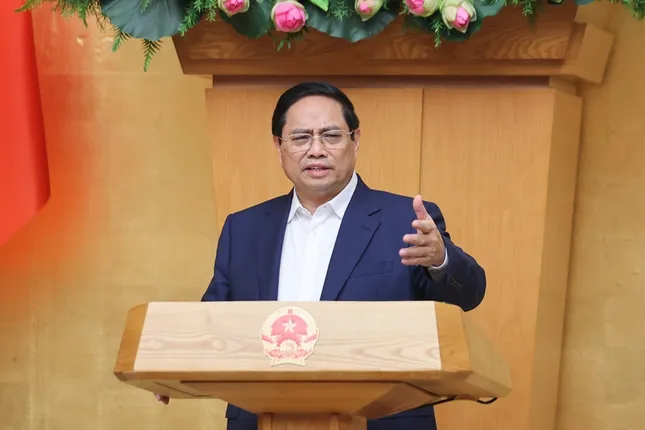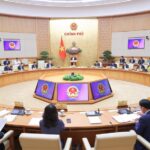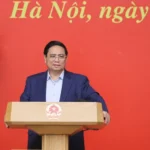On June 4th, Prime Minister Pham Minh Chinh chaired the regular Government meeting for May, focusing on socio-economic development, investment capital allocation and disbursement, and the implementation of national target programs over the past five months. He also outlined key tasks for June and the coming months.
“We must overcome all challenges”
In his concluding remarks, the Prime Minister commended the efforts of ministries and local governments, acknowledging their contributions to the country’s overall socio-economic achievements during the first five months. He then outlined key tasks and solutions for June and the coming period, starting with thoroughly preparing for the 9th session of the National Assembly.
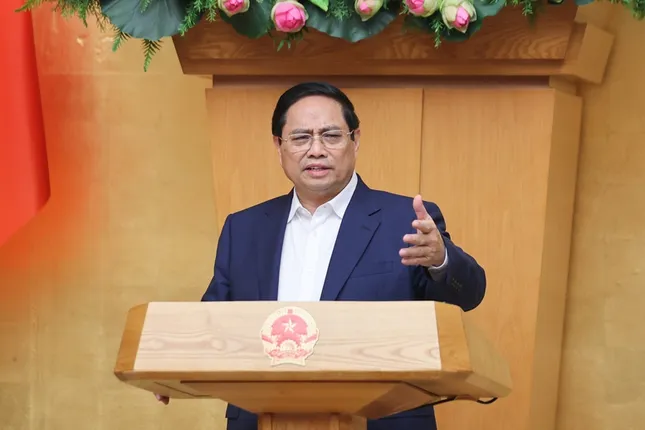
Prime Minister Pham Minh Chinh at the meeting. Photo: VGP
The Prime Minister emphasized the need to vigorously and effectively implement the Government’s action program based on the “four pillars” outlined in four resolutions of the Politburo. He instructed that any difficulties or obstacles related to institutions and laws must be resolved, stating, “We must overcome all challenges” to turn institutions into a competitive advantage. He further directed that over VND 20 trillion should be allocated to ensure that at least 3% of the budget is dedicated to science and technology.
Urgent development of a plan for redundant offices
The Prime Minister instructed the continuation of institutional perfection, organizational streamlining, and administrative procedure reform, including the digital transformation process. He urged the swift submission of decrees providing details on laws and resolutions that have taken effect. Additionally, he emphasized the need for decrees on decentralization and the delineation of authority and urged the resolute reduction and simplification of administrative procedures, along with the effective implementation of Proposal 06.
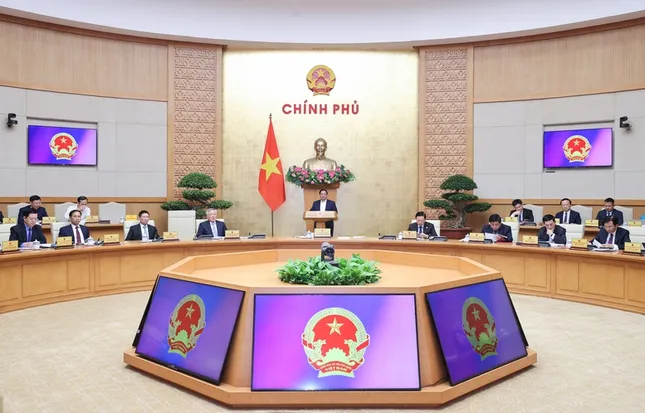
Meeting scene. Photo: VGP
The Prime Minister instructed the Ministry of Finance to urgently develop a plan and submit it to the National Assembly, outlining mechanisms and policies for the effective utilization of redundant offices resulting from organizational restructuring and administrative boundary adjustments.
He emphasized the priority of promoting growth by revitalizing traditional growth drivers (investment, export, and consumption) and vigorously increasing revenue while saving expenses. He directed a decisive 10% reduction in regular expenses to allocate resources for large projects. Additionally, he highlighted the importance of fostering new growth drivers, such as science and technology, innovation, digital economy, green economy, creative economy, sharing economy, circular economy, night-time economy, emerging industries, and the exploration of new development spaces like underground, marine, and space domains.
The Prime Minister assigned specific tasks to various ministries. He instructed the Ministry of Culture, Sports, and Tourism to collaborate closely with relevant ministries, sectors, and localities to meticulously prepare and organize activities commemorating the 80th National Day, including an exhibition of socio-economic achievements with the involvement of international consultants.
Regarding the Ministry of Education and Training, the Prime Minister directed them to focus on finalizing the proposal, report, and draft resolution of the Politburo on education and training. He also emphasized the importance of conducting the high school graduation exams and university and college entrance exams for the year 2025 effectively.
Implementing the program to bring 1,000 doctors to the community
As per the Prime Minister’s instructions, the Ministry of Health should promptly implement the program to bring 1,000 doctors to the community. They are also tasked with finalizing the proposal, report, and draft resolution of the Politburo on health care, population, and development. Both the Ministries of Health and Education and Training are encouraged to boldly hand over local medical and educational facilities, along with the management of human resources and infrastructure, to local authorities. These ministries will then focus on their core functions of state management and providing specialized guidance from the central to local levels.
The Average Vietnamese Income Script Achieves $28,370 Per Annum
According to experts, for Vietnam to join the ranks of high-income countries, there needs to be a period where its GDP growth reaches double digits (over 10%). This is an unprecedented threshold, an ambitious goal, yet not an impossible one. An ambitious scenario targets an 11-12% annual GDP growth rate during the period of 2025-2035, elevating the per capita income to $28,370 by 2045.
A Prime Minister’s Vision: Saving 10% of Recurrent Expenditure to Fund Grand Projects
“The Prime Minister emphasized that in 2025, continued discipline in managing recurrent expenditures will be crucial to freeing up resources for major projects and critical tasks. This calls for a nationwide effort, with all levels of government, industries, and citizens embracing frugality, thus contributing to the protection, development, and prosperity of our beloved country.”

